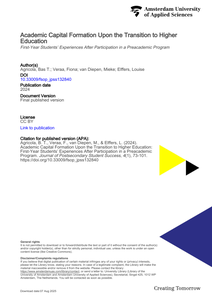Kick-Start College is a three-day pre-academic program (summer school) for prospective first year students of Inholland Rotterdam, University of Applied Sciences. The aim is to integrate students academically and socially, which could make the transition to higher education easier and eventually lead to lower dropout rates of students. Research has been conducted on both student experiences with the program as well as effects of the program. Method: pretest-posttest with academic-, social-, professional- and university integration1, self-esteem, motivation, evaluation.
DOCUMENT

The transition from secondary education to the first year of higher education is a phase in which students are faced with many challenges. First-year students may lack the academic capital that is needed to understand explicit and implicit rules of higher education. We investigated students’ participation in a preacademic program and the development of their academic capital. In a mixed method study, we showed that first-year students who participated in a preacademic program perceived peer mentors and teachers to be relevant sources of information, learned how to overcome educational barriers, and became more acquainted with explicit and implicit college requirements.
DOCUMENT

Background: Due to multimorbidity and geriatric problems, older people often require both psychosocial and medical care. Collaboration between medical and social professionals is a prerequisite to deliver high-quality care for community-living older people. Effective, safe, and person-centered care relies on skilled interprofessional collaboration and practice. Little is known about interprofessional education to increase interprofessional collaboration in practice (IPCP) in the context of community care for older people. This study examines the feasibility of the implementation of an IPCP program in three community districts and determines its potential to increase interprofessional collaboration between primary healthcare professionals caring for older people. Method: A feasibility study was conducted to determine the acceptability and feasibility of data collection and analysis regarding interprofessional collaboration in network development. A questionnaire was used to measure the learning experience and the acquisition of knowledge and skills regarding the program. Network development was assessed by distributing a social network survey among professionals attending the program as well as professionals not attending the program at baseline and 5.5 months after. Network development was determined by calculating the number, reciprocity, value, and diversity of contacts between professionals using social network analysis. Results: The IPCP program was found to be instructive and the knowledge and skills gained were applicable in practice. Social network analysis was feasible to conduct and revealed a spill-over effect regarding network development. Program participants, as well as non-program participants, had larger, more reciprocal, and more diverse interprofessional networks than they did before the program. Conclusions: This study showed the feasibility of implementing an IPCP program in terms of acceptability, feasibility of data collection, and social network analysis to measure network development, and indicated potential to increase interprofessional collaboration between primary healthcare professionals. Both program participants and non-program participants developed a larger, more collaborative, and diverse interprofessional network.
DOCUMENT
